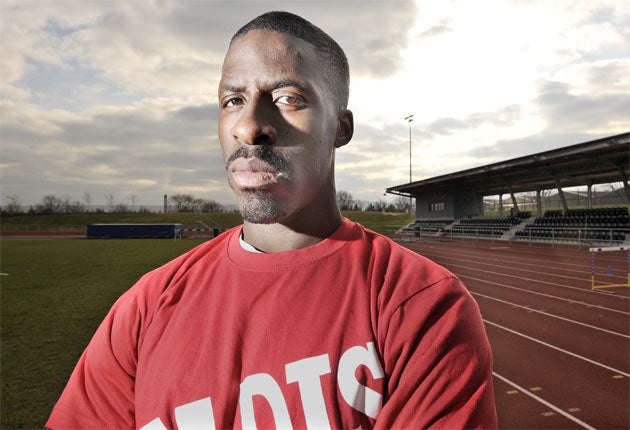James Lawton: Selective firmness has made Chambers a human pollutant
There may well be a day when he reflects that a degree of self-preservation in his old world might have provided him with a distinctly easier run

Someone somewhere in the upper echelons of British athletics, and in this year of all years, should get round to a degree of honesty in the matter of Dwain Chambers.
If you forgive the expression, they should come clean, even if it is only in the form of a grown-up admission of deep-seated prejudice against a man who, whatever he does now, is always likely to cause a degree of embarrassment to the athletics establishment.
What they should do is decide out in the open whether or not he has served properly his time as a drug cheat, and warrants a little encouragement in his 11th-hour stab at redemption, or have the nerve to place some explanation for their persistently negative attitude towards him alongside increasingly brutal action.
As of now, Chambers has been given the status of something close to a human pollutant.
Qualified as Britain's leading sprinter in the forthcoming World Athletics Championships in South Korea, demonstrably still the fastest man in the land six years after being banned for two years as one of the leading casualties of the Balco scandal, Chambers is declared persona non grata by UK Athletics before tomorrow night's Diamond League meet at Crystal Palace.
A 15-page submission by Chambers has been tossed aside. His barrister agent Siza Agha said: "UKA's position against Dwain leaves no room for redemption. Is it the message we want to send young people?" At 32, Chambers scarcely fits into the category of young person and no doubt the hard-line persuasion will applaud the tough posture of the British authorities. Others will once again sniff out something that might be described as selective firmness, a certain malleable morality.
Of course we went through some of this debate on the run-in to Beijing, when Britain, as the newly blessed Olympic hosts, had the government throwing so much money at elite sportsmen and women you might have imagined that running and rowing and riding bikes could indeed bring some lasting benefit to the morale of the nation.
Then, Chambers was told that he had as much chance of overthrowing the British Olympic Association's lifetime ban on convicted performance enhancing drug users as he had of going into orbit the next time he heard the starter's gun.
Christine Ohuruogu, as Chambers complained resignedly, was an entirely different matter. She sailed through her appeal against a similar ban, which came after she had served 12 months of suspension for missing three out-of-competition drug tests.
Ohuruogu had so much more in her favour. She performed brilliantly while winning a world championship gold – and then repeated the achievement in Beijing.
Would someone of lesser ability, someone who, as it happened, had not also threatened to go off and run for someone else if her appeal failed, have received quite such tolerance? We don't have to guess too hard at the answer of Dwain Chambers.
No, it is not a simple issue and no one is likely to win instant popularity by advocating any relaxing of the laws against performance-enhancing drugs. But then there is certainly an obligation to operate even-handedly within their limits.
One truth is that there may well be a day when Chambers reflects that when he was uncovered by the Balco probe, and failed in his desperate attempt to re-establish a living in the failing NFL Europe and with the Castleford Tigers in Rugby League, a degree of self-preservation in his old world might have provided him with a distinctly easier run.
Instead, he continued to cast doubts about the purity of the racing that came in the wake of his conviction and those of Marion Jones and Tim Montgomery. He might have soft pedalled a little as the scandal threatened to engulf such baseball icons as Barry Bonds and Roger Clemens.
Chambers swore that he would make, drug-free, something of what was left of his career. But he also insisted that among his crimes had been the ultimate one of being caught.
He alleged that members of the United States Olympic team in Beijing were tainted – and he asserted his belief in the old reality that in the race between crime and detection the criminals, with their masking agents, would soon again step ahead.
Better for his acceptance by officialdom in the last days of his renovated career would have been the role of martyr to his own mistakes.
Though the great Edwin Moses said that the testimony of Chambers had been helpful, working as it did against the kind of complacency that carried the Olympics of 1988 to the Ben Johnson disaster, it was perhaps not the message deemed most helpful by the athletic authorities.
Back in Seoul, Arthur Gold, chairman of the BOA, had claimed that at least 50 per cent of all competitors had tampered with some form of illegal performance enhancement. He was mocked, almost to the moment the head of the Olympics, Jose Antonio Samaranch, stepped up on to a podium and announced that sport was involved in a fight to the death.
The fight goes on, no doubt, and maybe part of Chambers' problem is that he is such a vivid, tortured reminder.
Join our commenting forum
Join thought-provoking conversations, follow other Independent readers and see their replies
Comments
Bookmark popover
Removed from bookmarks